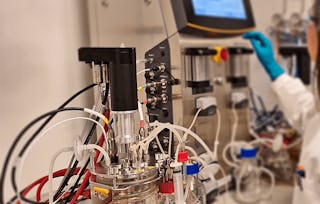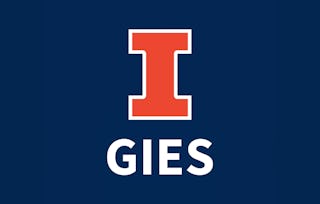Discover how fermentation is transforming industries and driving a sustainable future. This course begins by exploring the evolution of fermentation—from ancient food traditions to modern precision techniques—and why it matters today. You’ll dive into the science behind fermentation, including microbes, synthetic biology, and feedstocks, before examining the innovative products shaping global markets in food, beauty, and industrial materials. Finally, you’ll tackle one of the biggest challenges: scaling fermentation from lab to commercial production.

New Fermentation Markets and How They Scale
Seize the savings! Get 40% off 3 months of Coursera Plus and full access to thousands of courses.

Recommended experience
What you'll learn
Explain how fermentation evolved and why precision fermentation matters for sustainability.
Analyze market trends and product innovations shaping the global bioeconomy.
Evaluate scale-up challenges and strategies for moving from lab to commercial production.
Details to know

Add to your LinkedIn profile
November 2025
6 assignments
See how employees at top companies are mastering in-demand skills

There are 4 modules in this course
In the course orientation, we’ll get to know the course, our learning environment, and the tools we’ll use. Then, we’ll explore how fermentation has evolved—from ancient food traditions to cutting-edge innovations. Together, we’ll discover why precision fermentation is reshaping the future of food, sustainability, and the bioeconomy. This foundational module sets the stage for understanding the science and markets we’ll explore next.
What's included
4 videos4 readings2 assignments1 discussion prompt
Building on the big-picture context, this module takes us inside the science of fermentation. We’ll learn how traditional and precision fermentation differ, explore the role of synthetic biology, and examine the sustainability of common feedstocks. By the end, we’ll have the core concepts needed to understand how fermentation technologies work—and why they’re gaining traction across industries.
What's included
5 videos2 readings1 assignment
Now that we understand the science, it’s time to see what fermentation can create. This module highlights key product categories—from food and beauty to industrial materials—and connects them to global market trends. We’ll even explore an interactive map of regional fermentation hubs to see how geography, feedstocks, and innovation shape the bioeconomy.
What's included
6 videos2 readings1 assignment
In our final module, we’ll examine what it takes to bring fermentation innovations to scale. We’ll explore capacity constraints, technology readiness levels, and workforce needs. Through a scenario-based activity, we’ll step into the role of an advisor helping a startup navigate scale-up strategy. After completing this module, we’ll be ready to take the final assessment and earn our Coursera certificate!
What's included
6 videos6 readings2 assignments
Offered by
Explore more from Environmental Science and Sustainability
 Status: Preview
Status: PreviewTechnical University of Denmark (DTU)
 Status: Preview
Status: PreviewTechnical University of Munich (TUM)
 Status: Free Trial
Status: Free TrialUniversity of Illinois Urbana-Champaign

University of Illinois Urbana-Champaign
Why people choose Coursera for their career

Felipe M.

Jennifer J.

Larry W.

Chaitanya A.

Open new doors with Coursera Plus
Unlimited access to 10,000+ world-class courses, hands-on projects, and job-ready certificate programs - all included in your subscription
Advance your career with an online degree
Earn a degree from world-class universities - 100% online
Join over 3,400 global companies that choose Coursera for Business
Upskill your employees to excel in the digital economy
Frequently asked questions
To access the course materials, assignments and to earn a Certificate, you will need to purchase the Certificate experience when you enroll in a course. You can try a Free Trial instead, or apply for Financial Aid. The course may offer 'Full Course, No Certificate' instead. This option lets you see all course materials, submit required assessments, and get a final grade. This also means that you will not be able to purchase a Certificate experience.
When you purchase a Certificate you get access to all course materials, including graded assignments. Upon completing the course, your electronic Certificate will be added to your Accomplishments page - from there, you can print your Certificate or add it to your LinkedIn profile.
Yes. In select learning programs, you can apply for financial aid or a scholarship if you can’t afford the enrollment fee. If fin aid or scholarship is available for your learning program selection, you’ll find a link to apply on the description page.
More questions
Financial aid available,


